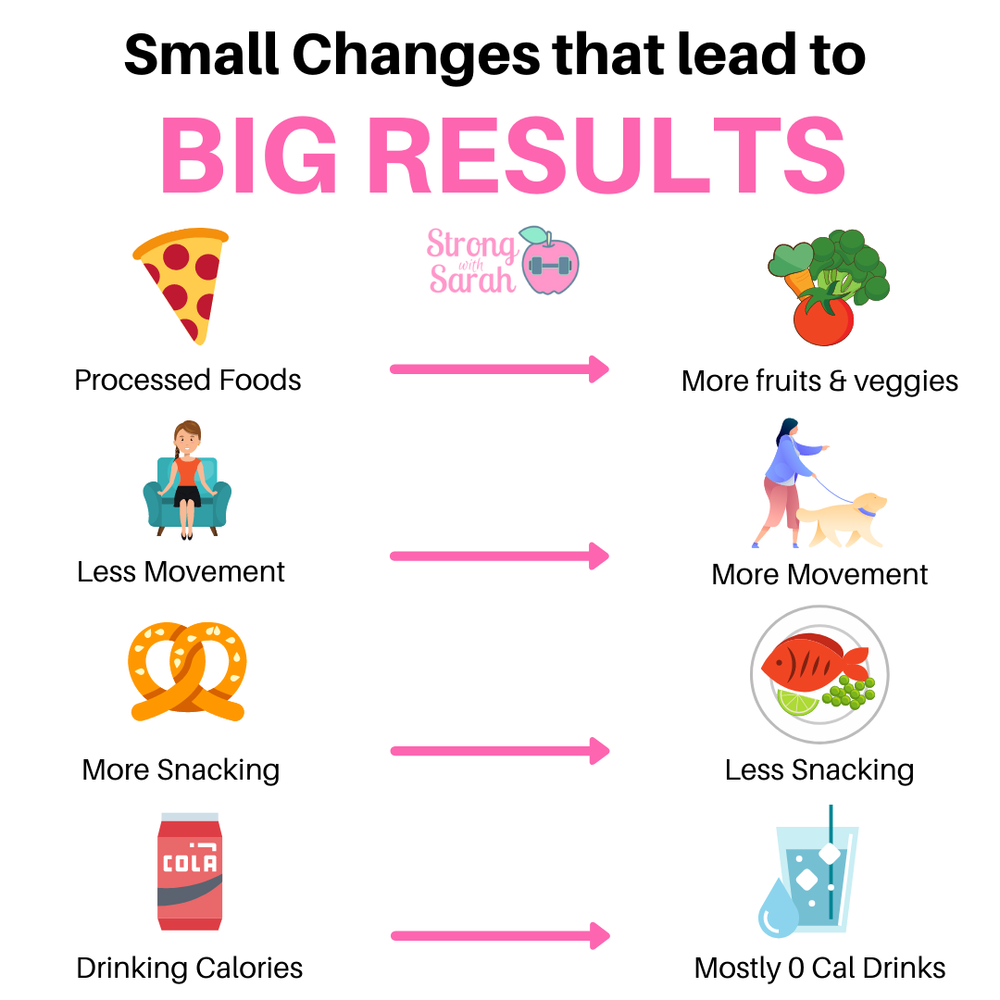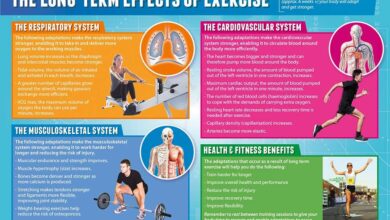
Little Things Add Up: Weight Loss Made Easy
Little things add up weight loss – it’s a concept that might seem too simple, but it holds a powerful truth. We often get caught up in grand plans and drastic measures, forgetting that the small, consistent changes we make in our daily lives can have a profound impact on our health and well-being.
It’s like the old adage says, “Rome wasn’t built in a day,” and neither is a healthy lifestyle.
This journey isn’t about deprivation or extreme measures; it’s about making subtle shifts in our habits, one step at a time. It’s about recognizing the cumulative effect of these seemingly insignificant choices and how they contribute to a healthier, happier you.
The Power of Small Changes

The journey to weight loss can seem daunting, but it doesn’t have to be an all-or-nothing endeavor. The key lies in understanding that even seemingly insignificant changes in daily habits can accumulate into significant progress over time. Think of it as a slow and steady drip, gradually filling a bucket, rather than trying to pour the entire contents of the bucket in one go.
These small changes, often overlooked, can make a world of difference in your weight loss journey.
Examples of Small Changes for Weight Loss
Small changes can add up to substantial calorie deficits over time. Here are a few examples:
- Choosing Water over Sugary Drinks:Sugary drinks are loaded with empty calories that contribute to weight gain. Switching to water, unsweetened tea, or sparkling water can significantly reduce your daily calorie intake. For example, a single can of soda can contain upwards of 150 calories, while a glass of water contains zero.
Over a week, this difference can add up to over 1000 calories.
- Taking the Stairs Instead of the Elevator:Every little bit of movement counts. Taking the stairs instead of the elevator provides a mini-workout and burns extra calories. A 150-pound person can burn approximately 5 calories per minute by climbing stairs. Over time, this seemingly small change can contribute to a significant calorie deficit.
- Adding a Few Extra Steps to Your Daily Routine:Instead of parking right next to the entrance, park further away and walk a little bit. Take a walk during your lunch break. Stand up and move around every 30 minutes while working. These small increments of movement can add up to a considerable calorie burn over the course of a day, week, or month.
Studies and Real-Life Stories
Numerous studies have demonstrated the effectiveness of small, consistent changes in achieving weight loss goals. A study published in the Journal of the American Medical Association found that participants who made small, sustainable changes to their diet and exercise habits lost more weight and kept it off for longer than those who tried to make drastic changes.
The study emphasized the importance of focusing on gradual and consistent changes rather than short-term, extreme measures.Beyond scientific research, countless real-life stories illustrate the power of small changes. Individuals who have successfully lost weight often cite their commitment to making gradual adjustments to their daily routines as a key factor in their success.
They might have started by replacing one sugary drink a day with water, or adding a 15-minute walk to their daily schedule. These seemingly small changes, compounded over time, led to significant weight loss and improved overall health.
Breaking Down the “Little Things”
The concept of “little things” adding up to significant weight loss can seem overwhelming. It’s easy to get caught up in the idea of drastic changes, but the truth is that sustainable weight loss comes from consistent, small changes. This approach allows you to build healthy habits gradually, making it more likely to stick with them in the long run.
To break down these “little things” effectively, let’s categorize them into different areas of daily life: diet, exercise, sleep, and stress management.
Diet
Small changes in your diet can significantly impact your weight loss journey. By making minor adjustments, you can reduce your calorie intake and improve your overall nutritional intake.
We all know those little choices add up when it comes to weight loss, and the holidays can be a real test. It’s easy to get caught up in the festive spirit and overindulge, but don’t despair! Learning how to build a healthier holiday plate can make a big difference.
From choosing leaner protein options to focusing on colorful vegetables, making mindful choices can help you enjoy the season without sacrificing your goals.
| Little Thing | Impact on Weight Loss |
|---|---|
| Swap sugary drinks for water or unsweetened beverages | Reduces calorie intake without sacrificing hydration. |
| Choose whole grains over refined grains | Provides more fiber, which promotes satiety and helps regulate blood sugar levels. |
| Incorporate more fruits and vegetables into your meals | Increases nutrient intake, provides fiber, and helps manage calorie intake. |
| Cook more meals at home | Allows you to control ingredients and portion sizes, reducing unhealthy fats and added sugars. |
| Read food labels and be mindful of serving sizes | Promotes awareness of calorie and nutrient content, enabling better choices. |
Exercise
Regular exercise is crucial for weight loss, and even small amounts can make a difference.
| Little Thing | Impact on Weight Loss |
|---|---|
| Take the stairs instead of the elevator | Increases calorie expenditure and improves cardiovascular health. |
| Walk or bike to work or errands | Incorporates physical activity into your daily routine. |
| Stand up and move around every hour | Reduces sedentary time and increases calorie burn. |
| Add a few minutes of exercise to your daily routine | Gradually builds physical activity habits and promotes overall health. |
| Try a new activity you enjoy | Increases motivation and makes exercise more enjoyable, leading to greater consistency. |
Sleep
Sleep plays a vital role in weight management, affecting hormone levels and appetite regulation.
| Little Thing | Impact on Weight Loss |
|---|---|
| Aim for 7-8 hours of sleep per night | Promotes hormonal balance, reducing hunger hormones and increasing satiety hormones. |
| Establish a regular sleep schedule | Regulates your body’s natural sleep-wake cycle, improving sleep quality. |
| Create a relaxing bedtime routine | Prepares your body for sleep, promoting better sleep quality. |
| Avoid caffeine and alcohol before bed | Can disrupt sleep patterns and interfere with sleep quality. |
| Ensure a comfortable sleep environment | A cool, dark, and quiet room promotes better sleep. |
Stress Management
Chronic stress can lead to weight gain by affecting hormonal balance and increasing cravings for unhealthy foods.
| Little Thing | Impact on Weight Loss |
|---|---|
| Practice relaxation techniques like deep breathing or meditation | Reduces stress levels and promotes overall well-being. |
| Engage in activities you enjoy | Provides a distraction from stress and promotes positive emotions. |
| Spend time in nature | Reduces stress hormones and promotes relaxation. |
| Connect with loved ones | Provides social support and reduces feelings of isolation. |
| Seek professional help if needed | Provides tools and strategies for managing stress effectively. |
Building Sustainable Habits
The key to long-term weight loss isn’t about drastic changes that leave you feeling deprived and overwhelmed. It’s about building sustainable habits that seamlessly integrate into your lifestyle. Think of it as a marathon, not a sprint. Small, consistent changes, when woven into the fabric of your daily routine, can lead to remarkable results over time.
A Step-by-Step Guide to Habit Formation
Adopting new habits can be challenging, but with a structured approach, it becomes more manageable. Here’s a step-by-step guide to help you navigate this process:
Setting Realistic Goals
Start by identifying one or two specific habits you want to change. Don’t try to overhaul your entire lifestyle at once. For example, instead of aiming to “eat healthier,” focus on incorporating one new fruit or vegetable into your daily diet.
Remember, progress is about taking small steps in the right direction.
Starting Small
When it comes to new habits, less is more. Instead of committing to a 60-minute workout every day, start with 15 minutes, three times a week. As you get comfortable, you can gradually increase the intensity or frequency.
This gradual approach makes it easier to build momentum and avoid feeling overwhelmed.
Gradually Increasing Intensity or Frequency
Once you’ve established a new habit, you can begin to increase its intensity or frequency. If you’ve been walking for 15 minutes three times a week, try increasing the duration to 20 minutes or adding an extra day. This gradual escalation helps you build upon your success and prevents plateaus.
The Importance of Consistency, Accountability, and Support Systems, Little things add up weight loss
Consistency is the cornerstone of habit formation. It’s not about perfection; it’s about showing up day after day, even when it’s challenging. To maintain consistency, accountability and support systems play a vital role.
Consistency
The more consistently you practice a new habit, the more ingrained it becomes. Even on days when you don’t feel like it, make a conscious effort to stick to your routine. Over time, your brain will start to crave the positive feelings associated with the new habit.
Accountability
Having someone to check in with can significantly increase your chances of success. This could be a friend, family member, or a fitness professional. Sharing your goals and progress can provide motivation and keep you on track. Consider joining a support group or online forum for additional accountability.
You know how they say little things add up in weight loss? Well, it’s true! It’s about those small, consistent choices, like swapping out a sugary treat for a healthier option. Speaking of healthy options, check out this list of 8 RD-approved pumpkin flavored snacks to buy at Trader Joe’s ! You can satisfy your cravings while staying on track with your goals.
Remember, those small changes can make a big difference over time.
Support Systems
Surrounding yourself with a supportive network can make a world of difference. Find people who encourage your goals and celebrate your successes. This could be friends, family, or even a personal trainer. Having a support system can help you stay motivated and overcome challenges.
You know how they say it’s the little things that add up? Well, that’s true for weight loss too. Choosing to drink water instead of soda, opting for a smaller portion, or even just taking a few extra steps each day – these small choices can really make a difference.
But sometimes, it’s hard to know where to start. That’s why I recommend checking out this article on an RD-approved approach to eating for fullness and satisfaction. It gives great tips on how to make healthy choices that will actually keep you feeling satisfied.
Remember, those small changes, when combined with a smart eating strategy, can lead to big results in the long run.
Beyond the Basics

We’ve explored the power of small changes and the importance of building sustainable habits. Now, let’s delve into a more mindful approach to weight loss – focusing on how we eat and move.
Mindful Eating
Mindful eating is about paying attention to your food and your body’s signals. It’s about savoring each bite and recognizing when you’re truly hungry and when you’re full. Here are some tips for incorporating mindful eating into your daily routine:
- Pay Attention to Portion Sizes:Use smaller plates, measure your food, and avoid eating directly from the container. This helps you consume a more appropriate amount without overeating.
- Chew Your Food Thoroughly:Take your time, chew each bite 20-30 times before swallowing. This allows your body to better digest the food and signal fullness more effectively.
- Avoid Distractions While Eating:Put away your phone, TV, and laptop. Focus on the taste, texture, and aroma of your food. This helps you appreciate your meals and eat more mindfully.
- Listen to Your Body’s Hunger Cues:Pay attention to your body’s signals of hunger and fullness. Eat when you’re truly hungry and stop when you’re comfortably full.
Low-Impact Exercises
Incorporating physical activity into your daily routine can be as simple as making small changes. Low-impact exercises are great for beginners and those looking for gentler forms of exercise. Here are some examples of low-impact exercises you can easily incorporate into your day:
- Walking:A brisk walk for 30 minutes most days of the week can significantly improve your fitness and contribute to weight loss. You can walk around your neighborhood, at a park, or even on a treadmill.
- Swimming:Swimming is a full-body workout that’s gentle on your joints. It’s a great way to burn calories and improve your cardiovascular health.
- Yoga:Yoga combines physical postures with breathing techniques, promoting flexibility, strength, and mindfulness. It can help reduce stress and improve overall well-being.
Combining Mindful Eating and Exercise
The most effective approach to weight loss is a combination of mindful eating and regular exercise.
“When you combine mindful eating with regular physical activity, you create a synergistic effect that promotes sustainable weight loss and improves overall health.”
Mindful eating helps you make healthier food choices, while exercise boosts your metabolism and burns calories. This combined approach leads to a more balanced and sustainable lifestyle that supports long-term weight management.
The Psychological Impact of Small Changes
The journey to weight loss is not just about calories and exercise; it’s deeply intertwined with our psychology. Small changes, while seemingly insignificant, can have a profound impact on our motivation, self-belief, and overall success in achieving our weight goals.
The Role of Motivation and Self-Belief
Motivation is the driving force behind any behavior change, and weight loss is no exception. When we believe in our ability to succeed, we are more likely to stay committed to our goals. Small changes can foster this self-belief by providing early wins and a sense of accomplishment.
The positive feedback loop created by these initial successes fuels our motivation, making us more likely to continue making healthier choices.
Building Confidence Through Small Achievements
Focusing on small, achievable goals is crucial for building confidence. Instead of aiming for drastic changes, start with manageable steps. For instance, instead of trying to eliminate all sugary drinks, begin by reducing your intake by one serving per day.
Each small victory, no matter how insignificant it may seem, contributes to a sense of progress and builds momentum. This gradual approach not only makes the process less daunting but also helps us develop healthier habits that are more likely to stick.
Overcoming Setbacks and Maintaining a Positive Mindset
Setbacks are inevitable in any journey, and weight loss is no different. It’s essential to remember that a single slip-up doesn’t negate all your efforts. The key is to learn from mistakes and get back on track as quickly as possible.
Here are some strategies for overcoming setbacks and maintaining a positive mindset:
- Focus on the positive:Instead of dwelling on the setback, shift your attention to the progress you’ve made. Remind yourself of your accomplishments and the reasons why you started this journey.
- Practice self-compassion:Be kind to yourself and understand that everyone makes mistakes. Avoid self-criticism and focus on moving forward.
- Re-evaluate your goals:If you’re struggling to stick to your plan, consider adjusting your goals. Make them more realistic and attainable.
- Seek support:Share your struggles with a friend, family member, or support group. Talking about your challenges can help you feel less alone and more motivated.
Final Wrap-Up: Little Things Add Up Weight Loss

Remember, the journey to weight loss is not a race, it’s a marathon. Don’t be discouraged by setbacks or moments of doubt. Embrace the power of small changes, celebrate your progress, and trust that these little things will add up to a healthier, more fulfilling you.






